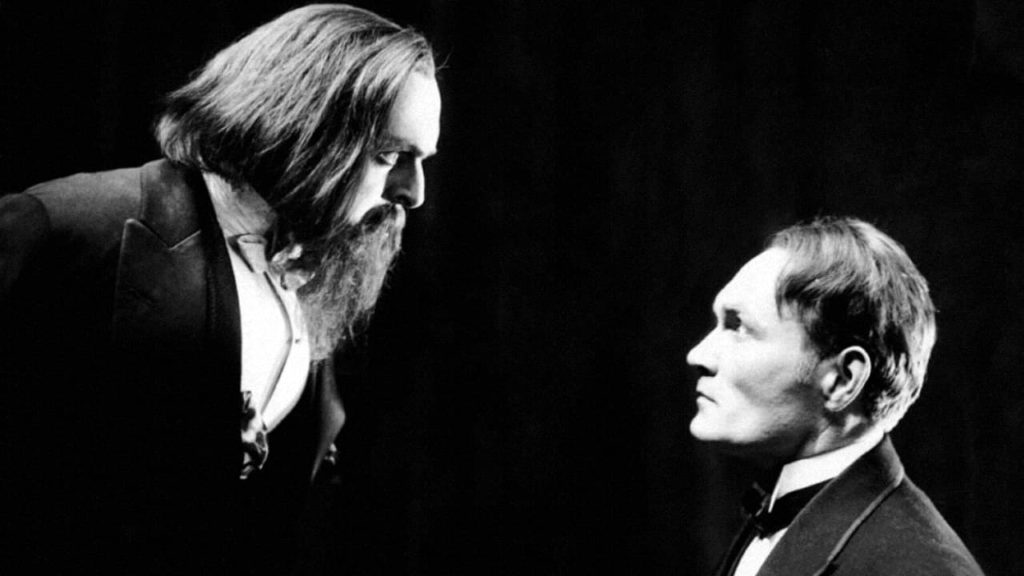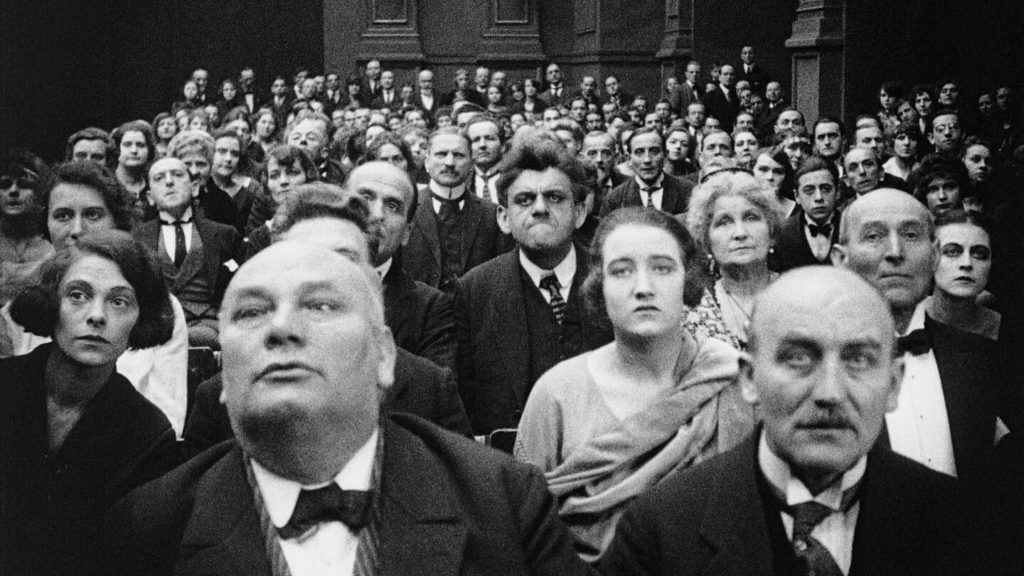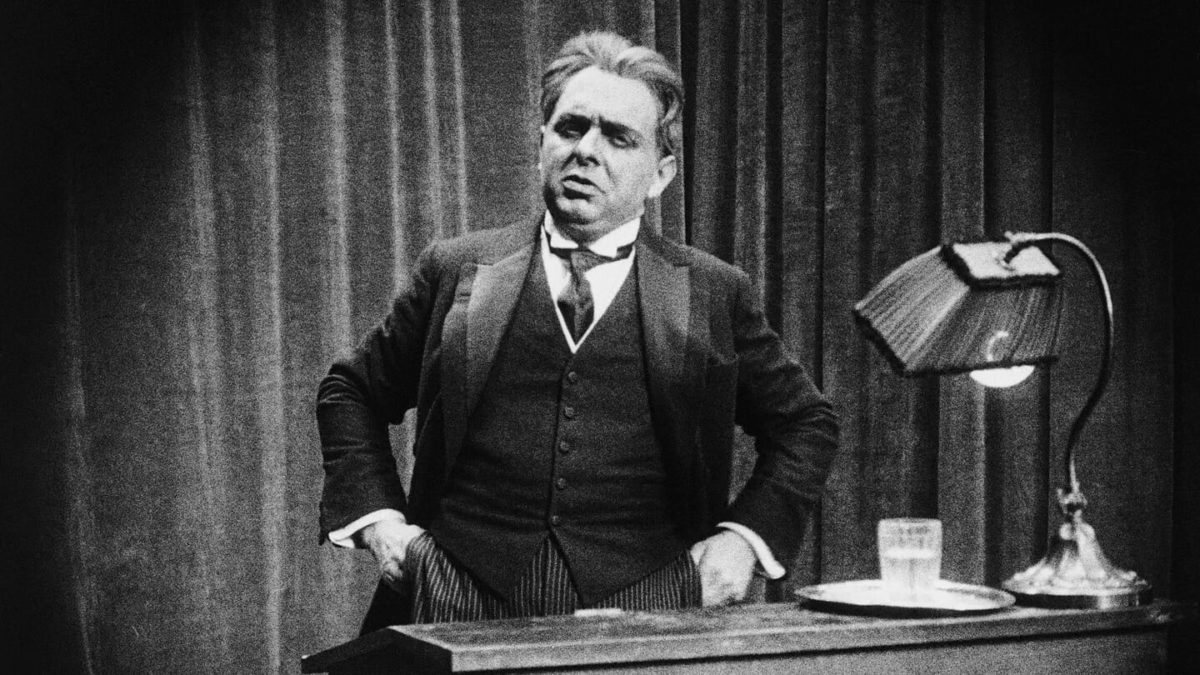Film serials peaked in the mid-to-late-1910s, but their epic-yet-episodic storytelling mode didn’t completely vanish. Take Dr. Mabuse, der Spieler, the two-part 1922 Fritz Lang masterwork that spans more than 4.5 hours. It has the spirit of a serial like Louis Feuillade’s Fantomas or Les Vampires, but crafted into a more flowing, building narrative.
The story centers around the anti-hero Dr. Mabuse (muh-BOOSZ-uh), played by Rudolf Klein-Rogge. Mabuse is a supervillain with “suggestion” powers — he can perform hypnosis and mind control to others in the room. Operating as a secretive behind-the-scenes force, he’s able to manipulate markets and games of chance in his favor to gain wealth and power, but he only ever appears in public in disguise.

“Der Spieler” from the title is typically translated to into “the Gambler,” but some meaning is lost in that translation: The German word also translates to “player” as in competitor, or even actor. The multi-pronged meaning of the title hints at the multiple roles that Mabuse plays throughout the film.
Like all films in or adjacent to the German Expressionist movement, this film is steeped in a dark and complex cultural context. (As for whether Dr. Mabuse is “in” or “adjacent to” German Expressionism, it’s not a matter of consensus: It has many, but not all of the hallmarks and plenty of thematic overlap. It’s certainly not quite as stylized and textbook an example as somthing like The Cabinet of Dr. Caligari.) The Weimar Repulblic, nominally at peace but despondent in attitude, had appetite for a character pulling the strings and able to manipulate society at his most corrupt whims. A story like this played into the country’s troubles and because it provided a cathartic power fantasy. (I’ll note that the extent one can apply this kind of sociological reading remains hotly debated, but it’s certainly part of a trend of Expressionist films.) Dr. Mabuse, der Spieler foreshadows many cultural themes that would emerge in Germany, like a fear of conspiracies against the public, which would be weaponized by Hitler and turned against Jews and other outsiders.

Dr. Mabuse der Spieler shows new heights for its time in sophisticated cinematic storytelling, especially in the cross-cut editing: The story’s perspective hops effortlessly between not only characters and settings but chronologies, a juxtaposing of complex ideas and stories in a way that feels intuitive. Like a good mystery novel, the film leads you to conclusions at a pace that’s occasionally nonlinear, but always for maximum revelatory impact.
The film also displays Lang as a master of composition and images. Many shots here are absolutely riveting, with Lang and DP Carl Hoffman making use of every inch of the frame for visual content that amplifies ideas in the story. Lang’s career is full of depictions of institutional rot and paranoia and entrapment, both of which are central themes of this film, visually manifested with secret lairs and shadowy, smoky back rooms.

The story is long and complex, but ultimately comes down, like many rise-and-fall stories, to its subject giving into personal desires and whims while at the peak of his power. Here, Mabuse falls for the aloof Countess Told, and kidnaps her, which ultimately spirals to his own defeat. The final hour of the film, in particular, is an extended and unceasingly tense climax of Mabuse’s grip on his world slipping into desperation. It’s truly masterpiece-level pre-Hitchcock suspense craft in its final act, with multiple moments of open-mouth astonishment.
Dr. Mabuse der Spieler is a rich, amazing film, but I cannot fully endorse it to modern audiences due to the elephant in the room: its exhausting runtime. The film would have just as much punch in half its extant length — there are many slow portions throughout. The quasi-supernatural elements also feel a bit out of place for what is otherwise an operatic but human crime story. On the other hand, there’s so much cinematic brilliance going on here that I encourage you to take the plunge if you are curious.
Note: I viewed this on I watched this film on the Eureka/Master of Cinema DVD printing, accompanied with David Kalat’s commentary.
Is It Good?
Very Good (6/8)
A few words on "Is It Good?" ratings for early cinema.
Dan is the founder and head critic of The Goods. Follow Dan on Letterboxd. Join the Discord for updates and discussion.

